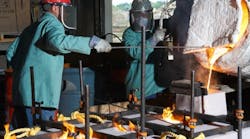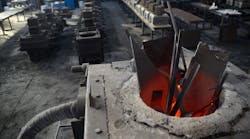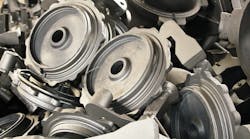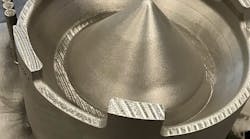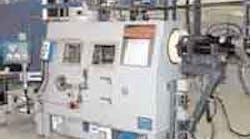The RSP beta machine, built by Belcan Engineering and now in commercial operation at RSP Tooling L.L.C.
Samples and process illustrations demonstrate the progress from concept to finished part.
An injection mold made through the rapid solidification process demonstrates excellent surface finish.
A spray-formed and heat-treated tool-steel forging die, left, and the gear produced from it, right.
A research program in progress for the past three years under the U.S. Dept. of Energy's Office of Industrial Technologies "Industrial Materials of the Future" program has already proceeded into the commercial realm, with demonstrable results for metalcasters.
The research, officially known as " Development and Demonstration of Advanced Tooling Alloys for Molds and Dies," is being led by the Idaho National Engineering and Environmental Laboratory, with partnership from the University of California-Davis; General Aluminum Manufacturing Co., a foundry in Conneaut, OH; the Glass Manufacturing Industry Council; and RSP Tooling L.L.C, the company that's now proving the study's findings in the commercial realm.
The study set out to improve the performance capabilities of mold and die materials in order to increase die life by at least 20%; and to reduce energy consumed in manufacturing and heat-treating dies by at least 25%. The strategy has been to develop and demonstrate a new class of mold-and-die tool steels tailored for rapid solidification processing (RSP), including spray forming.
Standard mold and die manufacturing is expensive and time-consuming because of the customized nature of each product. Also, tool steels are difficult to work, and the dies must have a high dimensional accuracy. By developing rapid solidification process (RSP) tooling to produce molds, dies, and tooling, production costs and energy consumption should be reduced. Thanks to improved steel microstructural qualities, and the potential to develop tooling alloys tailored to the process, die life should be extended. New heat-treating methods (low-temperature aging, rather than austenitizing/quenching/tempering), will add to the time and energy savings.
RSP tooling combines rapid solidification processing and net-shape materials processing in one step. A mold design is converted from a CAD file to a tooling master using rapid prototyping, and the pattern is transferred to a castable ceramic. This is followed by spray forming tool steel (or another alloy) onto the pattern to capture the shape, surface texture, and pattern details. The resulting form is cooled and separated from the pattern, and some machining may be done so it may be used with a mold base or holding block.
The research directed by Dr. Kevin M. McHugh has already completed a number of the project's planned stages. Tests have demonstrated the performance of selected ferritic tool steels respond to RSP. Analyses have included tensile testing, hardness measurement, SEM, EDS, DTA, optical microscopy, X-ray diffraction, and neutron diffraction. Modeling and computation have helped to determine the interplay of the spray plume and the tool pattern during tool formation.
Also, the alloy property's response to artificial aging was analyzed to establish the relationship of tool-steel microstructure and property, and to study microstructural transformation during varying heattreatments.
Currently, the project is engaged in studies involving modifications to alloy chemistries, and in designing and building solid models. Both of these efforts are scheduled to be completed by the end of this year. In the coming, third year of research, tool-steel alloy structure/property assessments will be completed and verified. Dies will be produced from modified alloys, and evaluated, and the final report will be delivered next October, according to the schedule.
Diecasters and foundries are among the industries poised to gain the most from the success of this project. In addition to the cost savings detailed above, improved die materials could eliminate solder and heat checks in finished tools.
Other industry segments due to gain from the RSP research include steelmaking, forging, commercial heat-treating, and glassmaking.
Perhaps the most significant advance in the technology has been its commercialization. A license to manufacture molds and dies was placed with RSP Tooling L.L.C, Solon, OH, which operates a beta RSP tooling machine built by Belcan Engineering's Specialty Equipment and Engineering division.
A total of eight diecasting dies have been produced on the beta machine. Also produced have been 13 plastic injection-molding dies, 12 forging dies, three permanent molds, and two extrusion dies. Performance results supplied by RSP Tooling indicate significant time and cost improvements have been achieved with the diecasting dies, as well as with the forging dies.
| Advantages of Rapid Solidification for Tooling
|





